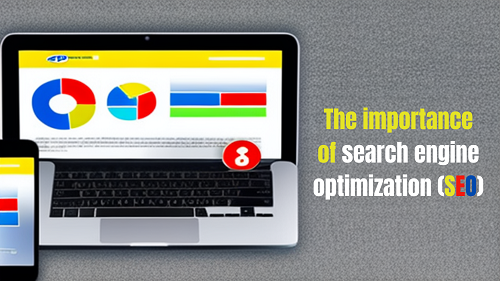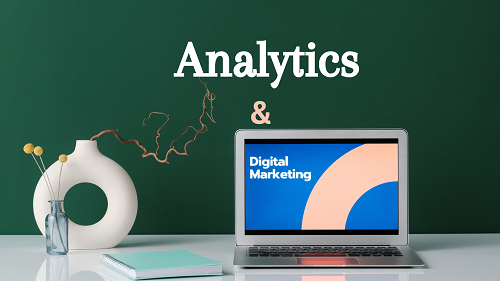The Digital Marketing Revolution: Insights and Strategies
As a digital marketing professional, I have witnessed the tremendous growth and impact of digital marketing on businesses of all sizes. From small startups to large corporations, digital marketing has become an essential component of every business’s marketing strategy. In this article, I will share insights and strategies for businesses looking to embrace the digital marketing revolution and stay ahead of the competition.
Introduction to Digital Marketing
Digital marketing is the practice of promoting products or services through digital channels such as search engines, social media, email, and mobile apps. It encompasses a wide range of tactics such as search engine optimization (SEO), pay-per-click (PPC) advertising, content marketing, social media marketing, email marketing, and mobile marketing.
Digital marketing has revolutionized the way businesses reach and engage with their target audience. It has leveled the playing field for small businesses, enabling them to compete with larger companies on a global scale. Unlike traditional advertising, digital marketing allows businesses to target their ideal customers with precision and measure the effectiveness of their marketing efforts in real-time.
The Evolution of Digital Marketing
Digital marketing has come a long way since its inception in the 1990s. Initially, digital marketing was limited to banner ads and email marketing. However, with the rise of search engines and social media, digital marketing has evolved to become a multi-faceted and sophisticated marketing discipline.
One of the biggest advancements in digital marketing has been the introduction of machine learning and artificial intelligence. These technologies have enabled marketers to analyze vast amounts of data and gain insights into consumer behavior that were previously impossible to obtain. This has led to the development of highly personalized and targeted marketing campaigns that deliver better results than ever before.
Benefits of Digital Marketing for Businesses
Digital marketing offers numerous benefits for businesses, regardless of their size or industry. Some of the key benefits include:
Increased Reach and Visibility
Digital marketing allows businesses to reach a global audience with minimal effort and cost. By leveraging digital channels such as social media and search engines, businesses can connect with their target audience regardless of their location.
Improved Targeting and Personalization
Digital marketing enables businesses to target their ideal customers with precision. By analyzing consumer data and behavior, businesses can create highly personalized marketing campaigns that resonate with their target audience and drive conversions.
Higher ROI and Conversion Rates
Compared to traditional advertising, digital marketing delivers a higher return on investment and conversion rates. By targeting the right audience with the right message at the right time, businesses can achieve a higher conversion rate and generate more revenue from their marketing efforts.
The Impact of Digital Marketing on Consumer Behavior
Digital marketing has had a significant impact on consumer behavior, changing the way people discover, research, and purchase products and services. Today’s consumers are more informed, empowered, and discerning than ever before, thanks to the wealth of information available on the internet.
Digital marketing has also made it easier for consumers to compare products and prices, read reviews, and make informed purchasing decisions. As a result, businesses must focus on delivering a seamless and personalized customer experience across all digital channels to attract and retain customers.
Key Digital Marketing Channels and Strategies
There are numerous digital marketing channels and strategies that businesses can use to reach and engage with their target audience. Some of the most effective channels and strategies include:
Search Engine Optimization (SEO)
SEO is the practice of optimizing a website to rank higher in search engine results pages (SERPs). By optimizing their website for relevant keywords and creating high-quality content, businesses can attract more organic traffic and improve their visibility in search results.
Pay-Per-Click (PPC) Advertising
PPC advertising is a form of digital advertising where businesses pay each time a user clicks on their ad. By targeting their ideal customers with relevant ads and keywords, businesses can drive more traffic to their website and generate more leads and sales.
Content Marketing
Content marketing involves creating and sharing valuable, relevant, and engaging content to attract and retain a target audience. By creating high-quality content such as blog posts, videos, and infographics, businesses can establish themselves as thought leaders in their industry and build trust with their target audience.
Social Media Marketing
Social media marketing involves promoting products or services on social media platforms such as Facebook, Twitter, and Instagram. By creating engaging content and building a strong social media presence, businesses can connect with their target audience and drive more traffic to their website.
Creating a Digital Marketing Plan
To achieve success with digital marketing, businesses must create a comprehensive digital marketing plan that outlines their goals, target audience, messaging, and tactics. Here are the key steps to creating a digital marketing plan:
Define Your Goals
The first step in creating a digital marketing plan is to define your goals. Do you want to increase website traffic, generate more leads, or boost sales? By setting clear goals, you can ensure that your digital marketing efforts are aligned with your business objectives.
Identify Your Target Audience
The next step is to identify your target audience. Who are your ideal customers, and what are their needs, interests, and pain points? By understanding your target audience, you can create personalized marketing campaigns that resonate with them and drive conversions.
Develop Your Messaging
Once you have identified your target audience, you need to develop your messaging. What are the key benefits of your product or service, and how can you communicate them effectively to your target audience? By crafting a compelling and persuasive message, you can differentiate yourself from your competitors and drive more sales.
Choose Your Tactics
Finally, you need to choose your tactics. Which digital marketing channels and strategies will you use to reach and engage with your target audience? By selecting the right tactics and measuring their effectiveness, you can optimize your marketing efforts and achieve better results.
Measuring the Success of Your Digital Marketing Efforts
To ensure that your digital marketing efforts are delivering the desired results, you need to measure their effectiveness. Here are some key metrics that you should track:
Website Traffic
Website traffic is a key indicator of the success of your digital marketing efforts. By tracking your website traffic, you can see how many people are visiting your site, how long they are staying, and which pages they are visiting.
Conversion Rates
Conversion rates measure the percentage of visitors who take a desired action on your website, such as making a purchase or filling out a form. By tracking your conversion rates, you can optimize your website and marketing campaigns to drive more conversions.
Return on Investment (ROI)
ROI measures the financial return on your digital marketing investment. By tracking your ROI, you can see how much revenue your marketing efforts are generating and identify areas for improvement.
Common Digital Marketing Mistakes to Avoid
While digital marketing offers numerous benefits, it’s important to avoid common mistakes that can derail your marketing efforts. Here are some common digital marketing mistakes to avoid:
Focusing on the Wrong Metrics
One of the biggest mistakes businesses make with digital marketing is focusing on the wrong metrics. Instead of tracking vanity metrics such as likes and followers, businesses should focus on metrics that directly impact their bottom line, such as conversion rates and ROI.
Not Investing Enough in Content Marketing
Content marketing is a key component of any digital marketing strategy. However, many businesses make the mistake of not investing enough in content creation and distribution. By creating high-quality content and promoting it effectively, businesses can attract more traffic and generate more leads and sales.
Ignoring Mobile Optimization
With more and more consumers using mobile devices to browse the internet, it’s essential for businesses to optimize their website and marketing campaigns for mobile. Ignoring mobile optimization can lead to a poor user experience and lost sales.
The Future of Digital Marketing
The future of digital marketing is bright, with new technologies and channels emerging all the time. Some of the key trends that are shaping the future of digital marketing include:
Artificial Intelligence and Machine Learning
Artificial intelligence and machine learning are set to revolutionize digital marketing by enabling marketers to analyze vast amounts of data and gain insights into consumer behavior that were previously impossible to obtain.
Voice Search
With the rise of smart speakers and voice assistants, voice search is becoming an increasingly important channel for businesses. By optimizing their content for voice search, businesses can connect with their target audience in new and innovative ways.
Augmented Reality
Augmented reality is another emerging trend in digital marketing. By using AR technology, businesses can create immersive and interactive experiences that engage and inspire their target audience.






